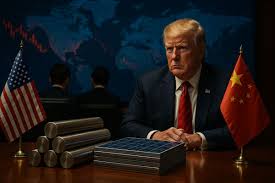By Radarr Africa
Copyright radarr

The Democratic Party in the United States has asked the administration of President Donald Trump to put pressure on China to reduce what it described as “structural overproduction,” essentially calling for a change in Beijing’s economic model.
The call was contained in a letter sent to Treasury Secretary Scott Bessent and other top trade officials as American and Chinese delegations opened fresh trade talks in Madrid, Spain.
According to Reuters, the lawmakers insisted that any new trade agreement with China must contain “binding requirements” for Beijing to scale down industrial overcapacity. They argued that China’s continued expansion in key sectors had destabilised global markets and threatened American jobs.
The talks in Spain are being led by U.S. Treasury Secretary Scott Bessent, Trade Representative Jamieson Greer, and Commerce Secretary Howard Lutnick. China’s delegation is headed by Vice Premier He Lifeng.
Democratic lawmakers serving on the House Select Committee on China expressed worry that unchecked Chinese production in industries such as steel and solar panels was distorting international trade. They said the practice was undermining fair competition and leaving American workers at a disadvantage.
“The People’s Republic of China’s historic and destructive use of structural overproduction to drive economic growth comes at an indisputable cost to U.S. industry, employment, and the stability of international markets,” the letter stated.
Chinese authorities, however, dismissed the U.S. concerns, accusing Washington of using the overcapacity argument as a cover for protectionism.
Foreign Ministry spokesman Lin Jian said Beijing’s policies were consistent with economic realities and not a violation of global trade rules. “We have repeatedly stated that hyping up the so-called overcapacity in China, which deviates from objective facts and economic laws, is providing an excuse for protectionism. Its true purpose is to curb China’s high-quality development. We firmly oppose this,” he told reporters in Beijing.
The latest exchange reflects long-running tensions between the world’s two largest economies, which have struggled to build on their fragile truce over tariffs in recent years. While the Trump administration insists that China must commit to deeper reforms, Beijing has continued to defend its industrial strategy, particularly in sectors it considers vital to future growth.
Analysts say the Democrats’ push signals that concerns about China’s trade and economic practices cut across party lines in Washington. The outcome of the Madrid talks will determine whether the two countries can move closer to a comprehensive trade deal or remain stuck in disputes that could further disrupt global markets.



